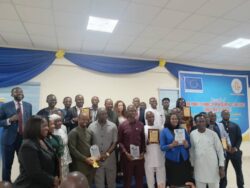The European Union (EU), in collaboration with government and the Food and Agriculture Organisation of the United Nations (FAO), has launched a €10million project to support vulnerable populations grappling with food insecurity in some parts of the Northern Region.
The project was launched in Accra and aims to empower communities in building resilient and profitable food production systems, while promoting practices that protect the environment and conserve natural resources.
It is also to ensure equitable access to food and nutrition, focusing on women and vulnerable populations, as well as strengthen governance structures to ensure the long-term viability of food systems.
EU Ambassador to Ghana, Irchad Razaaly, speaking at the ceremony noted that vital financial contributions by the EU reaffirm the importance of international solidarity in addressing global food security challenges aggravated by the Russia-Ukraine conflict. It also reflects shared commitment to ensuring food security, reducing poverty and promoting sustainable development in Ghana.
He added that the €10million emergency measure has been mobilised in record time and represents the EU and its member-states’ commitment and solidarity in the face of rising food costs.
For his part, Yurdi Yasmi – FAO deputy Regional Representative for Africa and Representative in Ghana, indicated that the collaboration not only demonstrates FAO’s commitment to rural families in Ghana but also exhibits its resolve to ending hunger and malnutrition while supporting the transition to more sustainable agrifood systems.
“The allocated funds will primarily focus on the Planting for Food and Jobs Phase II (PFJ Phase II) target commodities. These efforts complement the government of Ghana’s initiatives to mitigate the adverse impacts of rising food, fertiliser and fuel prices in vulnerable areas, in order to help alleviate poverty, hunger and malnutrition,” he further indicated.
Bryan Acheampong, Minister of Food and Agriculture – expressing appreciation on behalf of government, thanked the EU and FAO for coming in at a time when there is a need to refocus Ghana’s food systems and deliver on nutrition and resilience.
The Global Report on Food Crises estimated in 2022 that up to 205.1 million people face high levels of acute food insecurity in 45 countries. Back in 2022, in a ‘Team Europe’ approach, the European Commission mobilised €600million from the European Development Fund’s reserves to address the current food security.
As part of Europe’s response to global food insecurity, the funding aims at supporting people in African, Caribbean and Pacific countries, where humanitarian needs are the highest and where programmes to sustainably enhance food security and resilience were identified.










